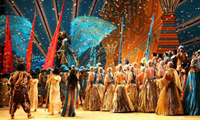
- 기사제공 : 정준모 (고양문화재단 전시감독)
Express yourself: Arts Council's new way to judge how well public money is spent
· Arts Self-assessment at heart of plan to cut bureaucracy
· Proposed regime could be model for public sector
Tuesday May 13, 2008
Arts organisations in England face being inspected every three years by a small team of experts who will scrutinise everything from how good their work is to how well they manage their finances.
The plans amount to a sea change in how publicly funded arts groups - from local theatres and galleries up to the Royal Opera House - are evaluated. Arts Council England is about to consult on what it believes could be a new model for judging success or failure in the public sector.
The new inspection regime is being brought in following a report by Sir Brian McMaster into excellence in the arts, in which he called for both greater self-assessment and less box-ticking. The problems of the present method of assessing arts companies were exposed last year when the Arts Council cut funding for nearly 200 organisations: many complained that they had not been given enough warning and decisions were made by "faceless bureaucrats".
Arts Council England's new chief executive, Alan Davey, told the Guardian that the new system would be based on both self-assessment and peer review, but he said it would avoid the mistakes of other public service models, such as Ofsted, which has spawned a sprawling industry of consultants.
In the new scheme, Davey said, the Arts Council would have to reduce its staff, so the system needed to be "light, flexible and fit for purpose".
He stressed that a firm set of plans was some way off but imagined a self-assessment process in which organisations would write honestly - on as little as one sheet of paper - about their strengths and weaknesses in artistic excellence/ambition, audience engagement and finance/management.
That would then be appraised by an inspector in the case of a small arts group, or a high-powered team in the case of a large national body. For example, English National Opera might be inspected by the artistic director of Opéra de Lyon, as part of a team that would also include a business leader.
The inspectors would regularly watch performances and then visit for an intense study, perhaps once every three years. "They might spend a day or two days in depth, in the organisation, speaking to all kinds of people in and outside of the organisation, testing the self-assessment and at the end of the process they will tell us and the organisation what they think," Davey said. "It wouldn't be a 200-page report - it would be something short and snappy."
Two problems which arise from the process could be: will self-assessing companies be honest, and will inspectors be honest? McMaster recently told an audience that the most difficult thing in peer group assessment was "peers telling other artists that they're crap".
Davey said he believed good arts organisations would be realistic, and it would foster a culture of honest assessment. "What we've got to do is make sure everyone learns a new way of behaviour and a new kind of honesty that is not based around competition," he said.
"If we start this happening all around the system, because people will all be assessing one another I believe - and maybe I'm being a little idealistic here - you'll get a change of behaviour and attitude towards the whole thing. At the moment people are probably defensive and worried about competitiveness."
He said the inspectors would have to see a range of performances over several months. "Just because one or two shows are bad doesn't mean a company is failing, because the company might be trying to innovate, and one of the things that should be looked at is the scale of artistic ambition."
Scotland has just begun a new system of self-assessment and inspection for its arts organisations, which includes show reports by designated inspectors which are posted on the internet. Davey was undecided about doing the same - organisations would be more inclined to report problems if they were not posted on the internet for all to see, he said.
The Arts Council says one model that will not return is the old panel system, whereby the same old faces would cast judgment on different arts organisations. "People who knew the system tell me that towards the end it became a little bit discredited, it became a little bit cliquey," said Davey.
The plan is to have a new system in place by the time of the next spending review in 2010-11.
Despite Arts Council protestations, the last funding round was widely condemned as a mess and Lady Genista McIntosh, former head of the Royal Opera House, is compiling a report looking into what went wrong.
Once the new plans are formulated Davey has promised a "real dialogue" with arts practitioners and organisations to make the new system work.
